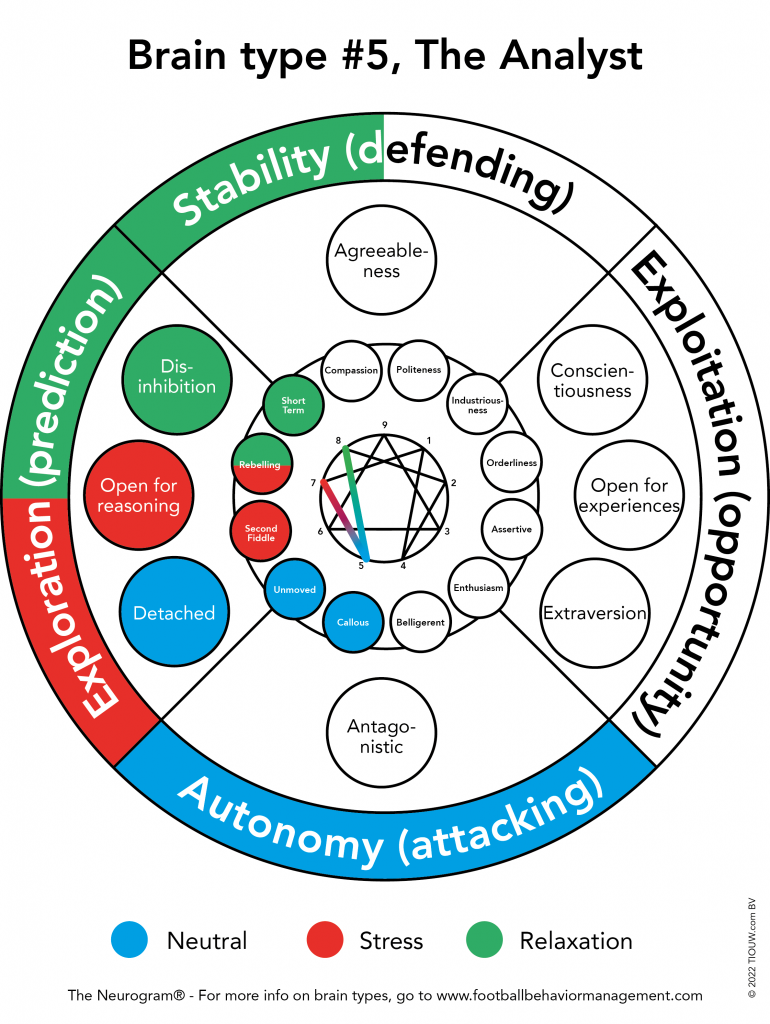
Autonomy
Marco van Basten, a renowned Dutch footballer and coach, demonstrates high autonomy due to several reasons:
- Individualistic Playing Style: Van Basten was known for his unique style of play. He relied on his own skills and instincts on the pitch, often taking independent actions that led to game-changing moments. His famous volley in the 1988 European Championship final is a prime example of this.
- Coaching Philosophy: As a coach, van Basten showed a strong preference for making independent decisions and implementing his own tactics and strategies, often irrespective of conventional wisdom or external pressures.
- Career Decisions: Van Basten made some key decisions in his career that demonstrated his autonomy. For instance, his decision to retire at the relatively young age of 28 due to an ankle injury, resisting pressure to continue playing, demonstrates his independent judgement and willingness to prioritize his health over his career.
- Advocacy for Change: Post retirement, van Basten has frequently voiced his ideas for reforming football, including changes to the offside rule, advocating for ‘sin bins’ instead of yellow cards, and reducing the number of games played. These proposals reflect his autonomous thinking and his willingness to challenge the status quo.
Detached
Marco van Basten’s perceived high score on Detachment could be due to several aspects of his personality and career:
- Private Nature: Van Basten is known to be private and reserved. He tends to keep a low profile and is not often seen engaging in media or publicity events outside of his professional obligations. This could be interpreted as a form of detachment.
- Early Retirement: Van Basten retired from professional football at a relatively young age due to injury. His decision to step away from the game, despite his immense talent and success, could be seen as a form of detachment.
- Coaching Style: As a coach, Van Basten was known for his disciplined and somewhat reserved coaching style. He was not typically seen as overly emotional or reactive during games, which may give an impression of detachment.
- Stance on Football Reforms: Van Basten has proposed several radical changes to the rules of football, such as abolishing the offside rule and introducing ‘sin bins.’ These proposals, which challenge long-standing traditions of the game, could be interpreted as a form of detachment from established norms.
It’s important to note that being detached does not necessarily mean being indifferent or uncaring. In Van Basten’s case, his detachment might be more about maintaining a sense of professional distance and focus.
Callous
- Direct Communication Style: Van Basten is known for his direct and straightforward communication style. While this can be effective, it might sometimes be perceived as insensitive or dismissive, particularly if others interpret his directness as a lack of tact or empathy.
- Unconventional Proposals: Van Basten has suggested several radical changes to football rules, which have not always been well-received. His insistence on these changes, despite opposition, could be interpreted by some as a disregard for tradition and the opinions of others.
- Coaching Decisions: As a coach, Van Basten made decisions that were not always popular with players or fans. While this is common in coaching, those affected might perceive these actions as callous if they felt their views or feelings were not considered.
Unenthusiastic
- Reserved Demeanor: Van Basten is known for his composed and somewhat reserved demeanor. He’s not typically seen as overly expressive or emotive, particularly in comparison to other footballers or coaches. This could be interpreted as a lack of enthusiasm.
- Early Retirement: Van Basten retired from professional football at the relatively young age of 28 due to an ankle injury. While this decision was primarily driven by health concerns, some may interpret this early exit from the sport as a lack of enthusiasm for continuing his career in spite of the challenges.
- Coaching Style: As a coach, Van Basten was often seen as focused and disciplined, rather than overtly passionate or excitable. Some might interpret this professional approach as unenthusiastic, even though it could equally be a reflection of his serious, concentrated approach to the job.
- Public Statements: Some of Van Basten’s public statements about football, such as his proposals to change certain rules of the game, might be interpreted as criticism of the current state of the sport, possibly reflecting a lack of enthusiasm.

Leave a Reply